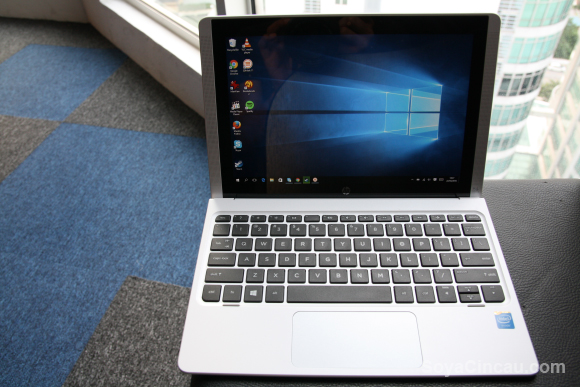2-in-1s are pretty popular these days because they provide the convenience of a tablet plus the productivity capabilities of a full-fledged laptop. Granted, most of them can’t permanently replace a dedicated laptop or computer, but they’re good enough for work that you can leave your heavy laptop at home and bring a space-aged tablet hybrid around with you.
HP’s Pavilion x2 is one that fits into that hybrid laptop category and I quite like it despite some of its obvious drawbacks.
Build
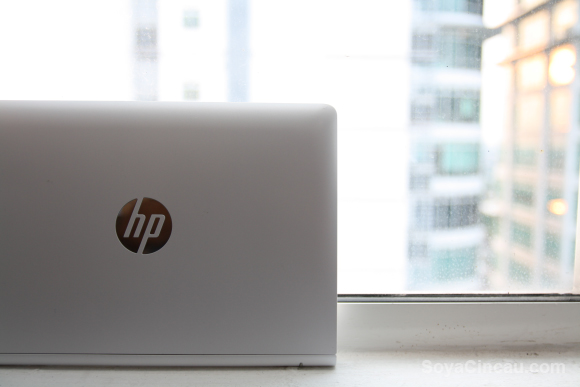
There’s no denying that it’s a handsome device. Closed or open, it will look good on any dream desk as it looks very modern and fairly premium despite its plastic construction. That said, you should be extra careful with the white version because that picks up quite a bit of dirt over time.
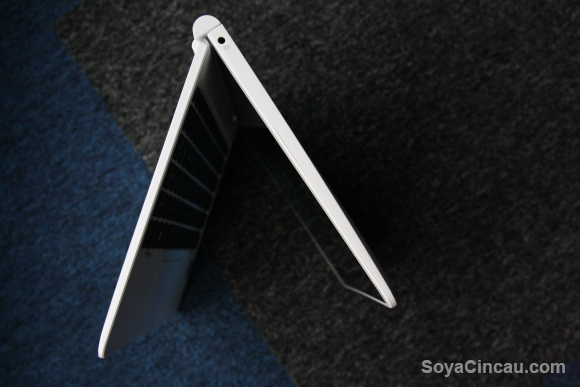
You can tell that thought was put into the construction of the device when you look at the hinge. When the device is open, the screen rolls out and elevates the keyboard, giving you better ergonomics than a flat keyboard. Plus, the magnets holding the tablet to the keyboard are quite strong, letting you lift the device without worry of either part coming off.
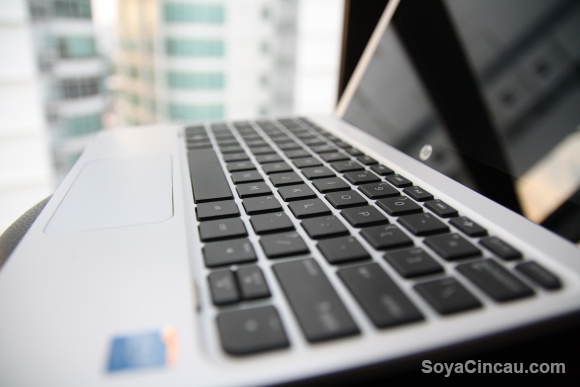
Since we’re on the topic of the keyboard, it does give a nice typing experience. For something so small and compact, the keys are well spaced and give great travel when typing. I had no problems typing on it for a full day despite coming from a mechanical keyboard.
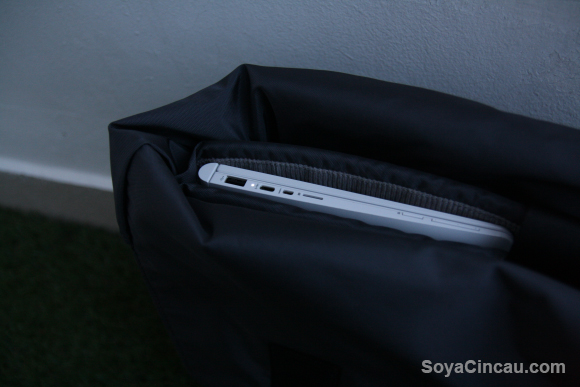
But, all that comes with a price as we arrive at my biggest problem with the Pavilion x2 — its weight. For something that only takes up half the space in my bag’s laptop sleeve, this 2-in-1 is pretty heavy, weighing in at a little over 1.1kg with both keyboard and tablet attached. It feels almost as heavy as the 13-inch Dell Inspiron 13 7000 series laptop I use as a daily driver.
[nextpage title=”For work, not play”]
Hardware and performance
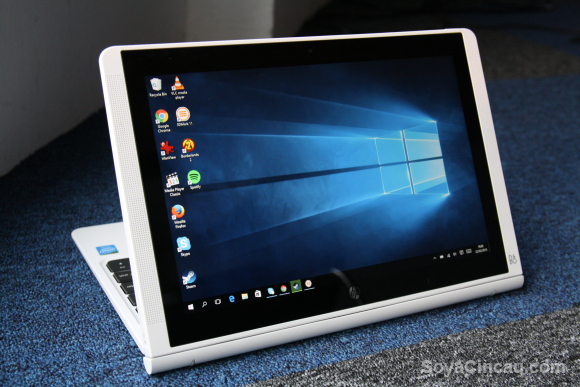
On the inside, it’s powered by an Intel Atom Z8300 processor with 2GB of DDR3L SDRAM and 32GB of Emmc storage which means you won’t be using intensive applications with this. But if you’re buying this little thing to be a gaming PC or a video editing rig, perhaps you’re looking at the wrong end of the market. That said, the device will get you through daily tasks like web browsing, video watching and word processing relatively easily.
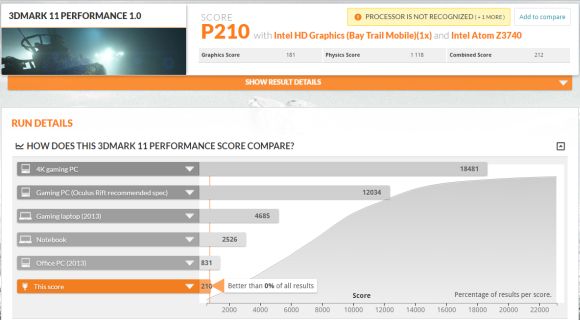
3DMark 11 benchmark scores.
The Pavilion x2 also sports a 10.1-inch 1280×800 resolution touch panel that leaves a lot to be desired. Text isn’t really as crisp as you’d like it to be, making it rather uncomfortable for reading lots of text over a long period of time, but if you’re watching videos, the low pixel density isn’t too noticeable.
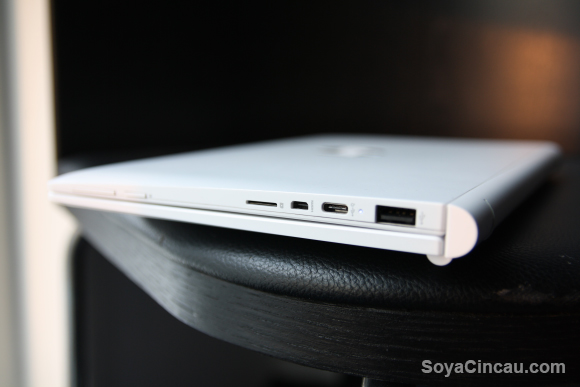
It does suffer from a lack of ports though, only featuring one full-sized USB 2.0 port, a USB Type C port (used for charging and power as well), a micro-HDMI port and a headphone jack. Then again, this is a tiny device so you’re probably already expecting this coming in. It’s nice that HP added a microSD card slot allowing you to expand that 32GB of internal storage which is definitely a welcomed feature.
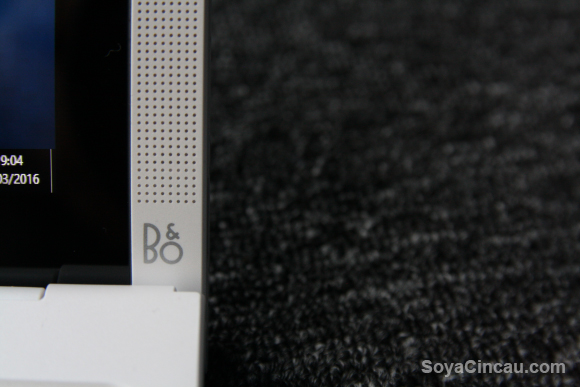
On paper, media consumption should be pretty decent with dual front facing stereo Bang & Olufsen-tuned speakers but the audio is rather soft and underwhelming. They’re not to say tinny, but certainly won’t fill a room with audio from the latest episode of House of Cards.
Usability
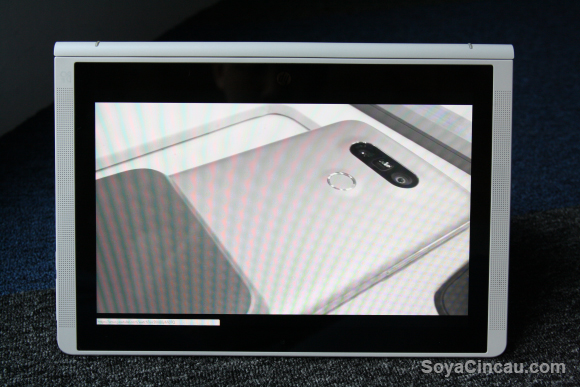
From my usage, this device served as a mobile workstation as its small size allowed for mobility while its rigidity allowed me to type with ease on my lap when space was limited. I covered a lot of events with this and in case you didn’t know, a lot of my work is done at the event or launch itself.
With how small this thing was, it was easy to whizz through a story in cramped events where I often have to share a seat, table or even a spot on the floor with many others. Battery life was decent as well and while it won’t last you an entire day on a single charge, it will get you through an afternoon or evening at your favourite watering hole.
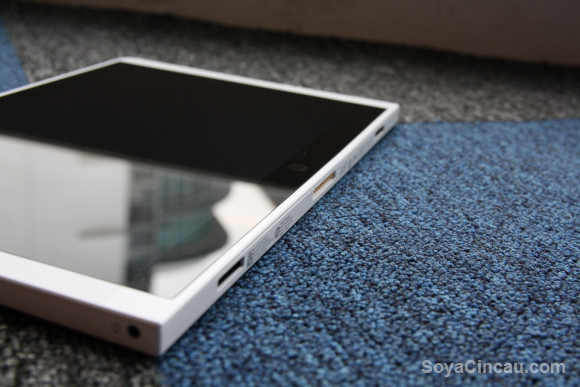
It didn’t really suffer from any performance issues with minor photo editing and word processing so it got me through events without much of a hitch. I could perform at nearly maximum productivity and a lot of that is down to the fact that the Pavilion x2 runs full Windows 10. You get access to everything you would need from a full-fledged desktop and really helps with productivity.
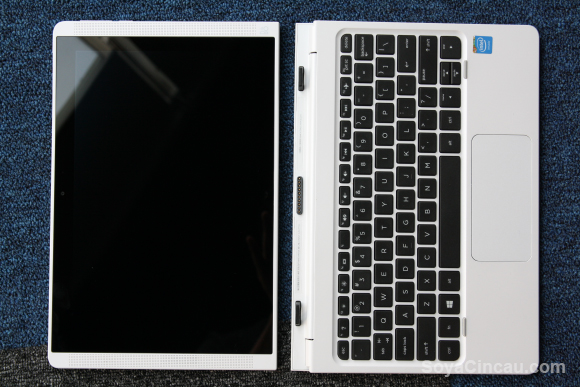
If I had a complaint, it would be of the trackpad which is definitely one of the worst things about the Pavilion x2. It misses very often and the clicks were mushy and inconsistent. In fact, it often doesn’t work outright when I boot the device up, forcing me to disconnect and reconnect the tablet to the keyboard before it started working again.
It could likely be a software bug, but to be honest with how bad the trackpad is, you’re better off utilising the touch panel instead. It’s also worth noting that it doesn’t detect our office’s 5GHz WiFi connection, but for the majority of users, I don’t think this is a dealbreaker.
Should you buy one?
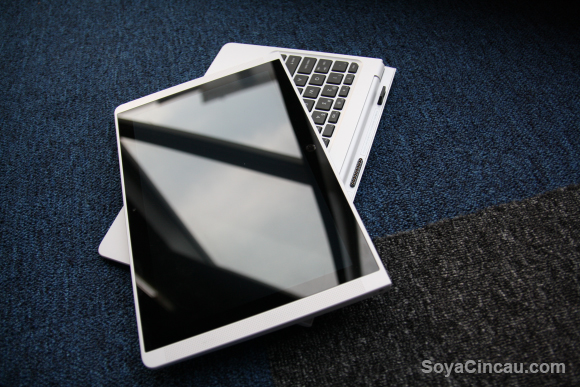
Well, not if you’re thinking of replacing your laptop or desktop. At RM1,399, the Pavilion x2 is ideal as a secondary or supplementary device. It’s small and compact with a decent build, so I can somewhat forgive the heavy weight. What really sells it for me is that good keyboard and a full Windows 10 experience.
While it won’t be my main PC, the HP Pavilion x2 is a device I’d gladly carry around when covering events. It’s not the best performer in any specific category, but it’s a well-rounded tablet-laptop hybrid that I can rely on for work, and that gives it a pass in my books.

